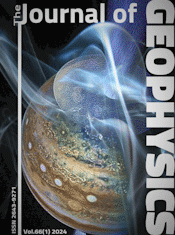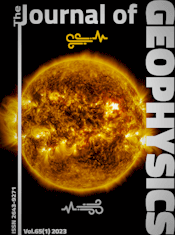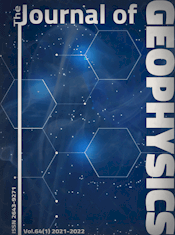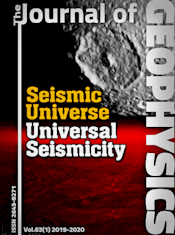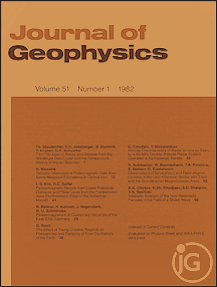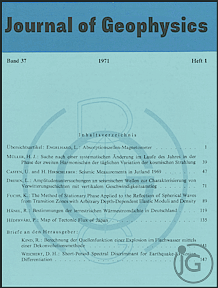Magnetic techniques for ascertaining the nature of iron oxide grains in basalts
Article Sidebar
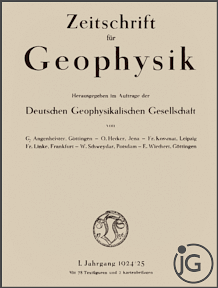
Vols. 1-18 (1924-1944), ISSN 0044-2801
Main Article Content
Abstract
Qualitative techniques are described by which the domain nature and magnetite-maghemite oxidation state of the iron oxides in basalts may be rapidly identified through measurements of hysteresis and susceptibility over a wide temperature range. Detailed studies made on different suites of basalts have revealed that their magnetic properties in most cases can be explained only on the basis of single-domain behaviour. Also it has been found that the observed variations in these properties between basalts are usually best explained by differences in the position the iron oxide minerals in the different samples occupy along the magnetite-maghemite oxidation chain. These observations suggest that the role of titanium usually found in association with iron oxides in basalts is to subdivide the grains physically rather than to form solid solutions of titanomagnetites or titanomaghemites. Some implications of these results to basalt formation and the magnetic anomalies such rocks could cause are discussed.
 ARK: https://n2t.net/ark:/88439/y055011
ARK: https://n2t.net/ark:/88439/y055011
Permalink: https://geophysicsjournal.com/article/111
Article Details
References
Butler, R.F. (1973) Stable single-domain to superparamagnetic transition during lowtemperature oxidation of oceanic basalts, J. Geophys. Res. 78:6868-6876
Chevallier, R., Bolfa, J., Mathieu, S. (1955) Titanomagnetites et ilmenites ferromagnetiques. Bull. Soc. Franc. Mineral. Crist. 78:307-346 and 365-399
Deutsch, E.R., Radhakrishnamurty, C., Strong, D.F., Rao, K.V., Patzold, R.R., Likhite, S.D. (1973) Magnetism of ophiolite complexes in the Newfoundland mobile belt. Abstract, IAGA 2nd General Scient. Assembly, Kyoto
Dunlop, D.J. (1965) Grain distribution in rocks containing single domain grains. J. Geomag. Geoelectr. 17:459-471
Evdokimov, V.B. (1963) The magnetic interaction of superparamagnetic particles. Russ. J. Phys. Chem. (English Transl.) 37:1018-1019
Feitknecht, W., Gallagher, K.G. (1970) Mechanisms for the oxidation of Fe3O4. Nature 228:548-549
Irving, E. (1970) The Mid-Atlantic Ridge at 45 N. XIV. Oxidation and magnetic properties of basalt; review and discussion. Can. J. Earth Sci. 7:1528-1538
Lepp, H. (1957) Stages in the oxidation of magnetite. Am. Mineralogist 42:679-681
Likhite, S.D., Radhakrishnamurty, C. (1965) An apparatus for the determination of susceptibility of rocks at different frequencies. Bull. N. G. R. I. 3:1-8
Likhite, S.D., Radhakrishnamurty, C. (1966) Initial susceptibility and constricted Rayleigh loops of some basalts. Current Sci. 35:534-536
Likhite, S.D., Radhakrishnamurty, C., Sahasrabudhe, P.W. (1965) Alternating current electromagnet type hysteresis loop tracer for minerals and rocks. Rev. Sci. Instr. 36:1558-1560
Lowrie, W., Fuller, M. (1971) On the alternating field demagnetization characteristics of multidomain thermoremanent magnetization in magnetite. J. Geophys. Res. 76:6339-6349
Marshall, M., Cox, A. (1972) Magnetic changes in pillow basalt due to sea floor weathering. J. Geophys. Res. 77:6459-6469
Morrish, A.H., Watt, L.A.K. (1958) Coercive force of iron oxide micropowders at low temperatures. J. Appl. Phys. 29:1029-1033
Neel, L. (1955) Some theoretical aspects of rock-magnetism. Advanc. Phys. 4:191-243
Neel, L. (1970) Interpretation des cycles d'hysteresis entrangles de certaines basalts. C. r. hebd. Seanc. Acad. Sci. Paris, 270:1125-1130
Radhakrishnamurty, C. Likhite, S.D. (1970a) Hopkinson effect, blocking temperature and Curie point in basalts. Earth Planet. Sci. Lett. 7:389-396
Radhakrishnamurty, C., Likhite, S.D. (1970b) Relation between thermal variation of low field susceptibility and magnetic hysteresis of basalts. Earth Planet. Sci. Lett. 9:294-298
Radhakrishnamurty, C., Sastry, N.P. (1970) A single-domain grain model for the low field constricted hysteresis loops of some basalts. Proc. Indian Acad. Sci. 72:94-102
Radhakrishnamurty, C., Likhite, S.D., Raja, P.K.S., Sahasrabudhe, P.W. (1971) Magnetic grains in Bombay columnar basalts. Nature, Phys. Sci. 235:33-35
Radhakrishnamurty, C., Raja, P.K.S., Likhite, S.D., Sahasrabudhe, P. W. (1972) Problems concerning the magnetic behaviour and determination of Curie points of certain basalts, Pure Appl. Geophys. 93:129-140
Readman, P. W., O'Reilly, W. (1972) Magnetic properties of oxidized (cation-deficient) titanomagnetites (Fe, Ti, □)3 O4. J. Geomag. Geoelectr. 24:69-90
Stacey, F.D. (1967) The Koenigsberger ratio and the nature of thermoremanence in igneous rocks. Earth Planet. Sci. Lett. 2:67-68
Uyeda, S. (1958) Thermo-remanent magnetism as a medium of palaeomagnetism, with special reference to reverse thermo-remanent magnetism. Japanese J. Geophys. 2:1-123



